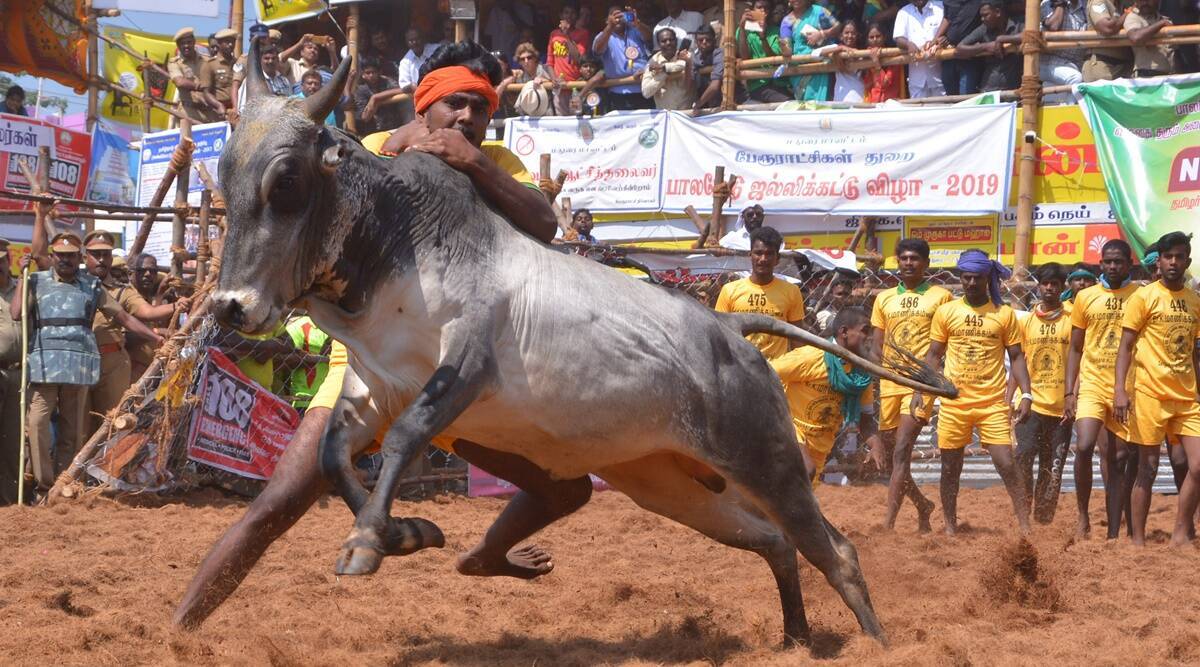What is the importance of ‘Jallikattu’ in preserving the native breed of bulls? Tamil Nadu asks the Supreme Court

As part of the hearing on the Tamil Nadu law allowing “jallikattu,” the Supreme Court asked the state government on Thursday how the bull-taming sport contributes to the preservation of the native breed of bulls.
“Jallikattu”, also known as “eruthazhuvuthal”, is a bull-taming sport played during Pongal harvest celebrations in Tamil Nadu.
According to a five-judge Constitution bench headed by Justice K M Joseph, animals may also be used for entertainment of humans, as in the case of “jallikattu”.
According to senior advocate Kapil Sibal, who represents Tamil Nadu, “jallikattu” is not entertainment per se, and those who display their bulls treat them with great care and compassion.
According to the bench, which also included justices, Ajay Rastogi, Aniruddha Bose, Hrishikesh Roy and C T Ravikumar, the animal, whose constitutional value is compassion, cannot be subjected to this treatment for human entertainment and is it possible for a state to allow such treatment based on its perception of cultural rights?
Any evidence does not support the statement that this is pure entertainment. Take a historical approach to this event,” Sibal said, adding that a person feeds the bull each day with great care and compassion for this event in January.
A member of the bench asked, “What does he gain from this? ”
According to the senior advocate, the market price of the bull goes up.
The bench responded to Sibal’s statement that the sport was not about entertainment, asking, “Not entertainment?” What is the purpose of the gathering? ” He responded, contending it is to demonstrate the vigour of the bull, how you have brought it up and also how strong it is.
Insisted Sibal, “The whole notion that this is for entertainment is completely wrong.”
In a 2014 judgment, the apex court banned bulls from performing in “jallikattu” events or bullock-car races across the country.
Earlier, it had rejected the Tamil Nadu government’s request to reconsider its 2014 judgment banning bulls from being used for “jallikattu” in the state and bullock cart races in India.
“Jallikattu” was allowed in Tamil Nadu by amending the central law – The Prevention of Cruelty to Animals Act, 1960.
There was an argument before the apex court that an amending law cannot perpetuate animal cruelty if it prohibits it.
In the day-long hearing on Thursday, the bench asked, “How does holding ‘jallikattu’ contribute to the preservation of the native breed?”.
Despite the prohibitions there are to prevent cruelty, the petitioners argue they are not being followed at the implementation level.
We must also lay down a principle that if a law contains many preventive measures that are violated in their entirety in real life, the court may be able to conclude that these prohibitions are unimplementable and that the Act remains cruel inherently,” the bench said.
During a hearing on whether animals have personhood, the top court noted that one of the petitioners’ advocates argued every animal is entitled to dignity.
In what sense is dignity defined? ” Sibal asked.
While saying that life is finite, Justice Joseph observed, “As long as you are alive, in whatever form you are alive in this world, you are entitled to be treated with dignity. Free from all kinds of physical pain… also mental pain and fear”.
The bench said one could not say he would use an animal as a plaything or a toy.
Sibal said it is the duty of everyone to protect nature in all forms.
The bench also wanted to know about the evidence to support the claim that it is a cultural practice.
The senior advocate argued the petitioners have contended that the amended law is a “colourable exercise” of power because it perpetuates cruelty, but this is a presumption.
He said the new regime seeks to prevent cruelty and cannot be a colourable exercise.
Sibal said there are several sports in which a person gets injured or even killed.
“What do you say about the effect of noise (during ‘jallikattu’)?” the bench asked.
Sibal said in marriage ceremonies, such a thing happens to a horse with bands all around the animal.
The hearing remained inconclusive and will continue on December 6.
The Constitution bench had on November 24 commenced hearing arguments on a batch of petitions challenging the Tamil Nadu and Maharashtra laws allowing “jallikattu” and bullock-cart races.
The Tamil Nadu government recently told the top court that “jallikattu” is a religious and cultural festival that bears a “religious significance” to the people of the state and does not violate the provisions of the Prevention of Cruelty to Animals (PCA) Act, 1960.
In a written submission filed in the apex court, the state said “jallikattu” is not merely an act of entertainment or amusement but an event with significant historical, cultural and religious value.
“Jallikattu not only preserves the cultural and traditional heritage, the continuous conduct of these events also addresses the cause of conservation of a native breed of cattle,” it has said.
A two-judge bench of the top court referred five questions to the apex court in February 2018.
It was said by the five-judge bench of the apex court that petitions challenging the Prevention of Cruelty to Animals (Tamil Nadu Amendment) Act, 2017 should be decided by a larger bench since they involve substantial questions pertaining to interpreting the Constitution.



